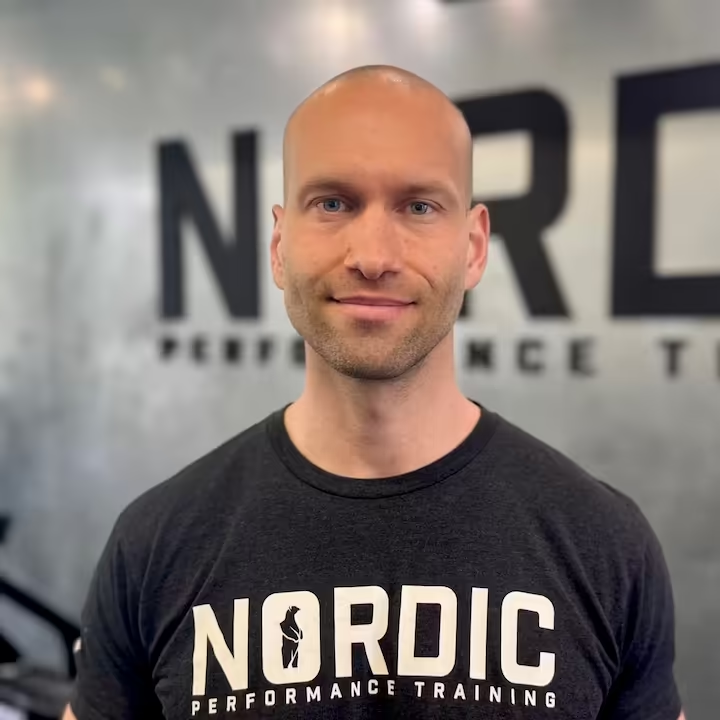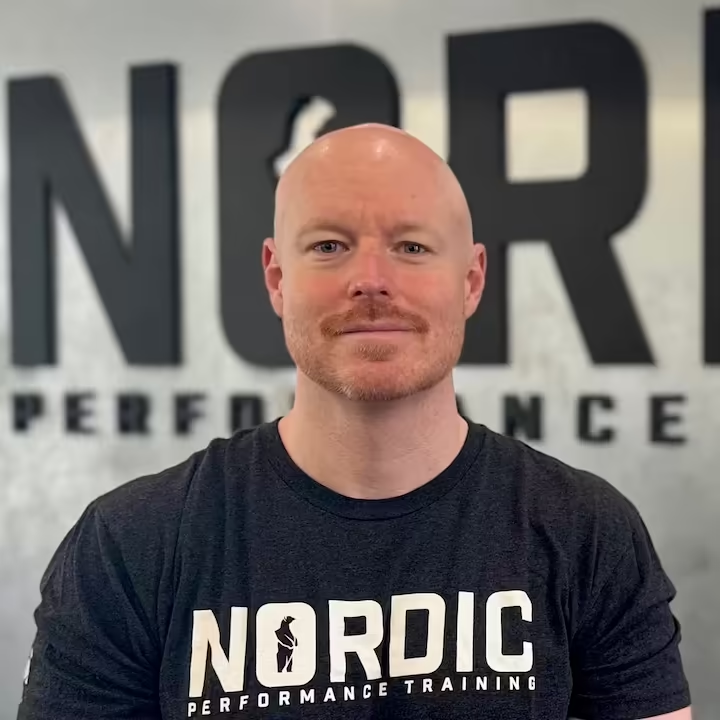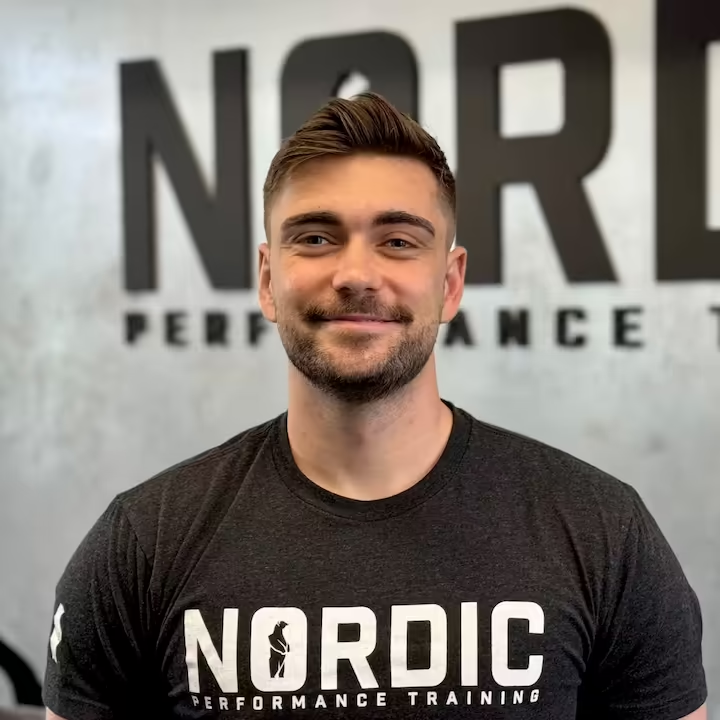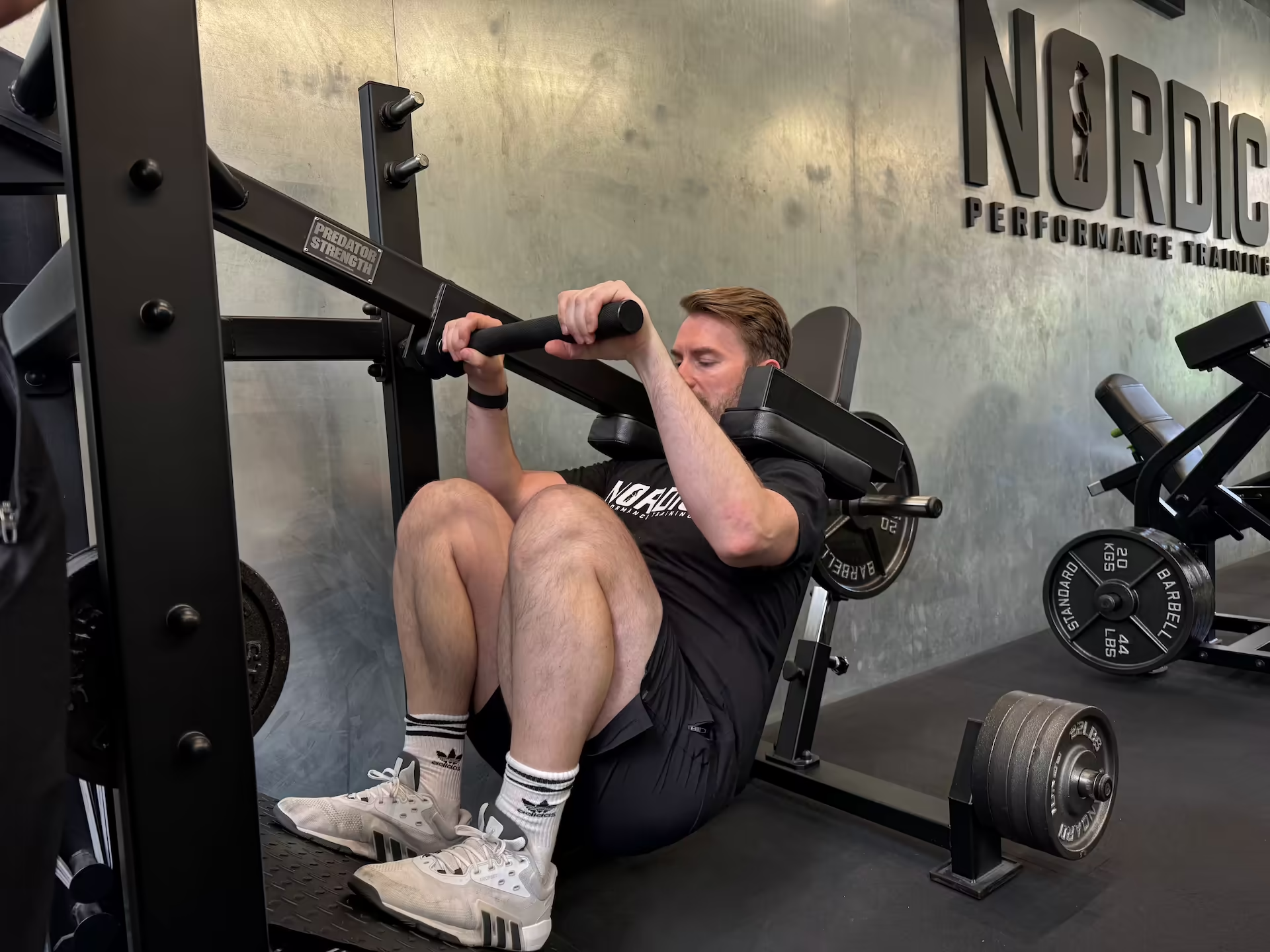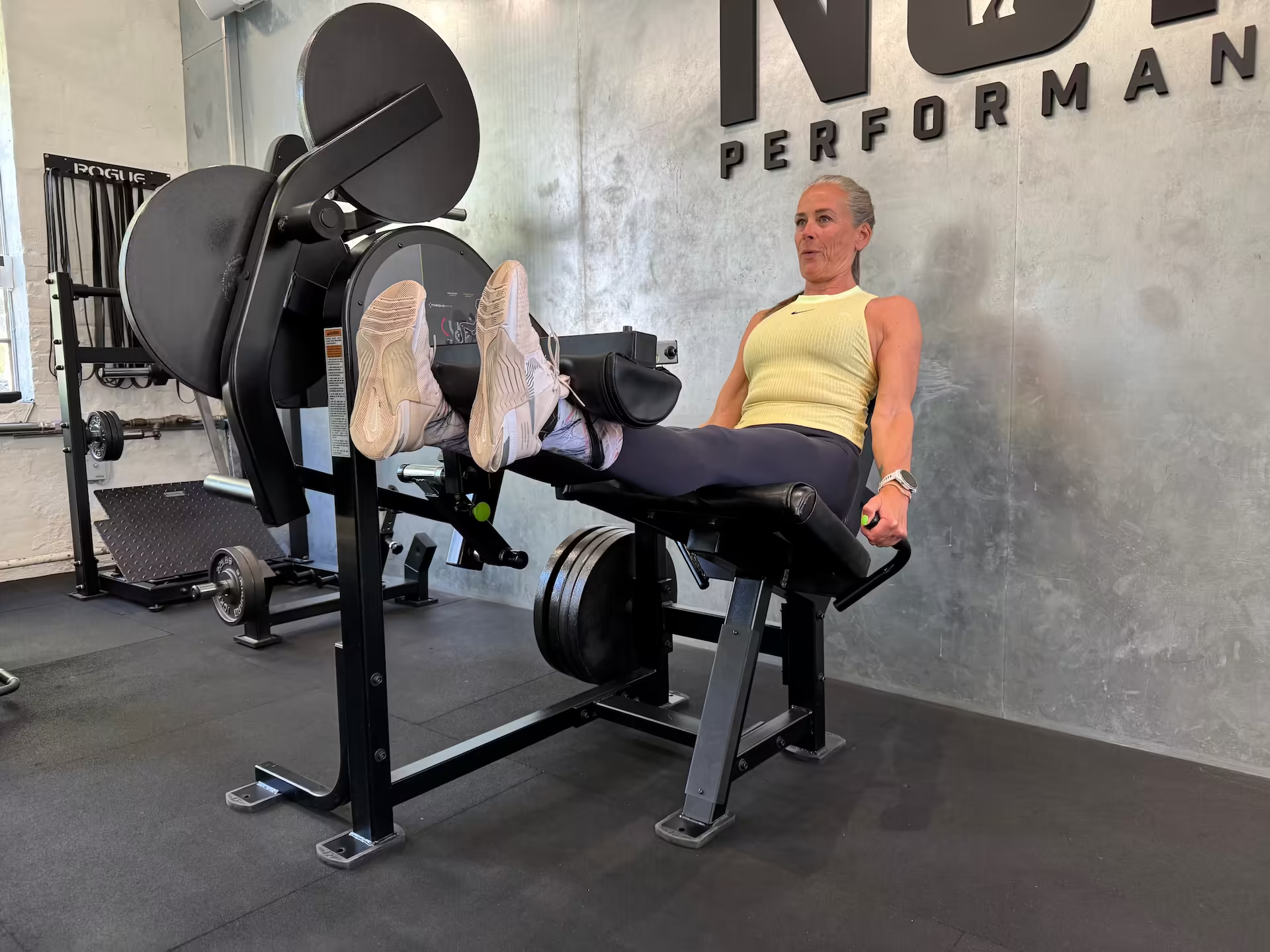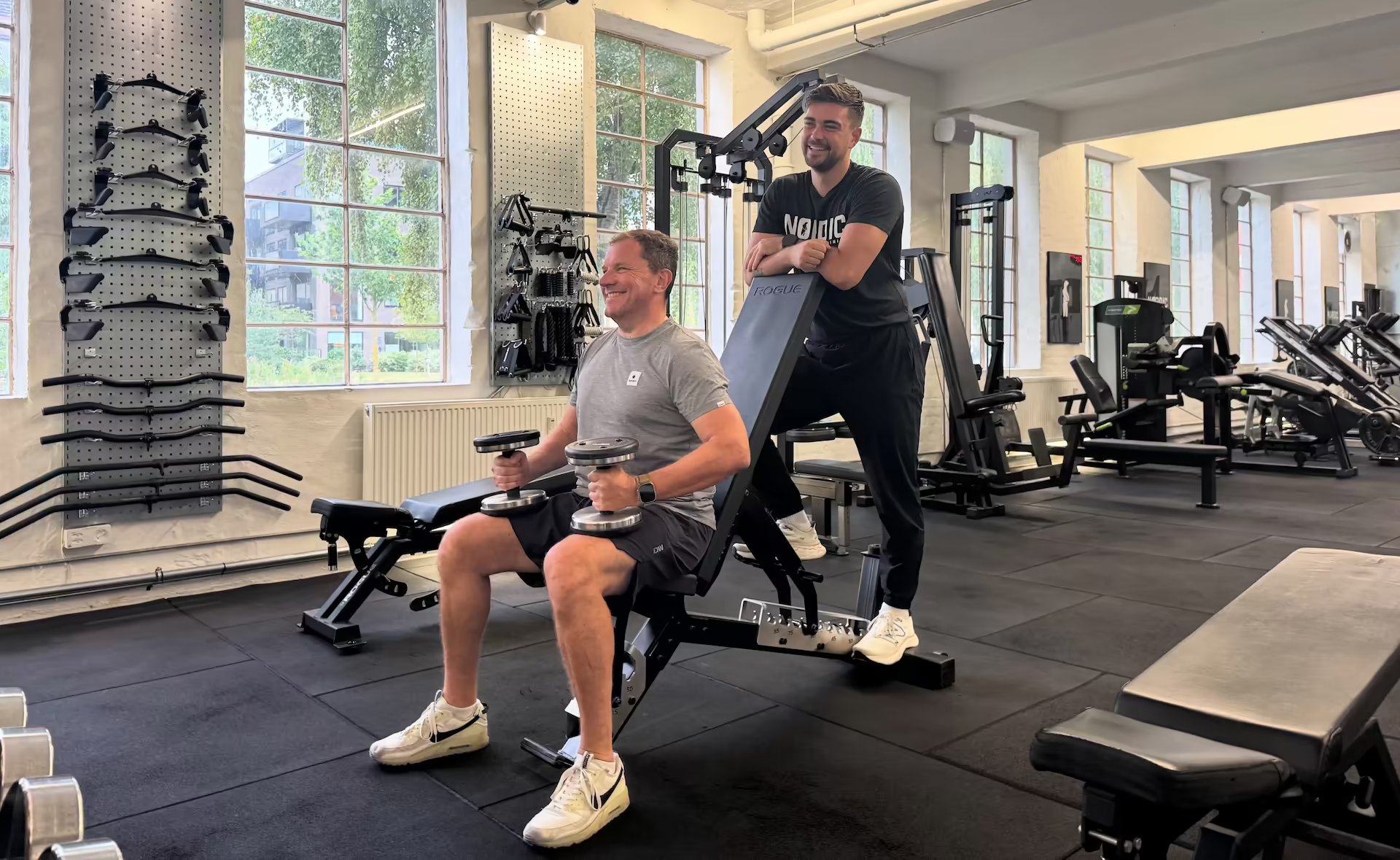How Do You Choose the Right Personal Trainer in Copenhagen?
The wrong personal trainer costs you much more than just money.
Marie spent 20,000 kr and 6 months with a trainer who had no plan. She ended up just as unmotivated as when she started, but now also disappointed in herself and sceptical about whether training could even work for her.
Peter spent almost the same amount on a trainer who actually knew what he was doing. 6 months later, he lifts his children without back pain and has the energy to be the father he wanted to be.
Both paid almost the same. Both invested months of their time. But only one of them got the life they dreamed of.
The difference was not motivation, genetics, or luck. It was choosing a trainer with documented expertise over one who just sounded convincing in the first conversation.
At Nordic Performance Training, as personal trainers in Copenhagen, we've had more than 3,000 satisfied clients and conducted over 50,000 personal training hours over the past 8 years. In that time, we've seen this pattern repeat itself again and again. The right decisions create lifelong improvements. The wrong decisions create expensive frustrations.
Want to go straight to the action-oriented content? Jump to:
- 5 red flags to avoid when choosing a personal trainer in Copenhagen
- 5 important questions to ask your potential personal trainer in Copenhagen
Or read on for the complete guide on how to avoid becoming the next Marie and ensure you become the next Peter.
What Do You Actually Want Out of Personal Training in Copenhagen?
The first thing you need to figure out sounds simple, but it's not: what do you actually want out of personal training in Copenhagen?
And no, it doesn't have to be super specific. A goal can perfectly well be something as fundamental as wanting to become a person who trains consistently 1-2 times per week, feeling more confident in your body's abilities, or building a routine that gives you more energy for everything else you want to do in your life.
It doesn't have to be a defined training goal like losing 10 kilos before summer or being able to do 5 pull-ups. It's perfectly fine if you're just looking to feel more comfortable or do something positive for yourself.
Still, it helps to have at least a general direction. Because personal trainers in Copenhagen, like professionals in any field, have different strengths and focus areas. The better you understand what you want, the easier it becomes to find someone who can help you get exactly there.
Examples of goals from our introductory consultations
Here are examples of the types of goals clients have shared with us during their introductory consultations. These might help you reflect on your own situation:
Marie, 57, manager from Frederiksberg: "I just want to feel younger and stronger again."
Rasmus, 41, CFO from Ørestad: "I want to be able to play with my children without back pain."
Louise, 37, hairdresser from Nordhavn: "I need something that's just about me."
And if you're reading this and thinking, "I don't actually know what my goal is," that's completely okay.
You don't need a crystal-clear goal to get started. Just deciding to begin is more than enough. A good personal trainer can help you figure out what matters to you, suggest realistic goals, and explain what it takes to move forward.
The important insight here is that your real goal is often not what you think it is. Rasmus didn't just want training — he wanted to be the engaged father he wishes to be. Louise didn't need a training plan — she needed to remember that she could prioritise herself. Marie wasn't just seeking weight loss — she was reinventing her identity.
Understanding this difference will help you choose a personal trainer who solves the right problem.
"You don't need a specific goal to start training. The goal might come later. The most important thing is just to show up, again and again." — Lucas Iversen, physiotherapist & personal trainer
How Much Time Can You Realistically Set Aside for Training?
This is one of the most important questions, and the most overlooked, when choosing a personal trainer in Copenhagen.
Training should make your life better. It should give you more energy for the long workdays, more structure for chaotic schedules, and more strength to handle everything from bike rides to carrying grocery bags up stairs. It should not compete with your calendar or feel like yet another pressure to live up to.
If you're balancing a demanding job, family, social obligations, and everything else life entails, you probably don't have 5+ hours per week available for training.
Here's the good news: you don't need 5+ hours per week.
Most of our clients train only 1-2 times per week with structured strength training in Copenhagen and get excellent results. Because when the training is properly structured, you don't need to be in the gym every day.
Take Anna, 34, primary school teacher from Nørrebro: "My back was killing me after full days on my feet with the kids. 2 training sessions per week didn't just solve the back pain, but gave me energy for both work and personal life."
"It's like investing. You can buy high-risk stocks and hope for big quick gains — or buy C20 index funds and know with certainty that you'll get solid returns over time. Most investors who stick with the simple, reliable strategy end up with better results than those who chase the big, quick gains." — Kasper Vinther, physiotherapist & personal trainer
Several large studies confirm this. 1-2 full body training sessions per week are sufficient to improve strength, build muscle, and support long-term health, as long as the training is performed with structure and progression.
For an in-depth explanation of why full body training works so effectively with lower frequency, read our complete Full Body training guide.
Busy Copenhageners understand efficiency in all areas of their lives. The best personal trainers apply the same efficiency in the gym.
So before you think "I can only manage 1-2 sessions," remember: quality and consistency matter far more than quantity. The trainer who helps you train consistently 1-2 times per week for 2 years will give you infinitely better results than the trainer who gives you a 5-day programme you stop after 2 months.
Your Personal Training Budget: Price vs. Value
Here's a good saying that's particularly true for personal training in Copenhagen: Price is what you pay. Value is what you get.
When you invest in quality personal training, you're not just paying for the hour you spend in a gym. You're paying for what that hour gives you in all the other 167 hours of your week. More energy at work, fewer tensions in neck and back, more focus, better sleep, and a stronger sense of control over your health.
We've seen this transformation countless times. A client starts with us thinking they just need to get a bit stronger, but what actually changes is how they carry themselves. They feel generally more confident in their body's physical abilities, more confident in business meetings, and generally more like the version of themselves they wanted to be.
That's why choosing a personal trainer solely based on hourly price can be misleading. A 600-kr session looks cheaper than a 900-kr session. But if the first doesn't give you anything more than random supervised training sessions that leave you unsure about progress, then the lower price has no value.
"The cheapest trainer is often the most expensive in the long run. You're not just paying for an hour — you're investing in how you feel in all the other 167 hours of your week." — Kasper Vinther, physiotherapist & personal trainer
The real costs of cheap personal training
We often meet people who have spent 15,000-30,000 kr on personal training that led nowhere. They convinced themselves they were saving money by choosing the budget option, but were actually just spreading the cost over more frustrating months without results.
To illustrate the difference, we've compared what you can typically expect from a budget trainer vs. an experienced, specialised personal trainer in Copenhagen:
What is actually more expensive?
A structured process with a professional trainer who follows your progress, understands your life, and gives you the tools to keep training for the rest of your life. That creates a lasting difference — not just during your sessions, but across all the other hours of your week.
When it works, it becomes the most affordable solution in the long run, because you avoid the expensive cycle of starting over again and again.
Johanne, 44, estate agent from Amager, had previously spent 12,000 kr on small group training that mostly ran her tired in circuit training with kettlebells and burpees without any measurable strength progress. After investing in an experienced educated trainer at 800 kr per session, she was stronger, felt younger, and her knee pain was gone after just 3 months. "The expensive trainer actually turned out to be the cheapest solution," she said.
What Should You Look for in a Personal Trainer in Copenhagen?
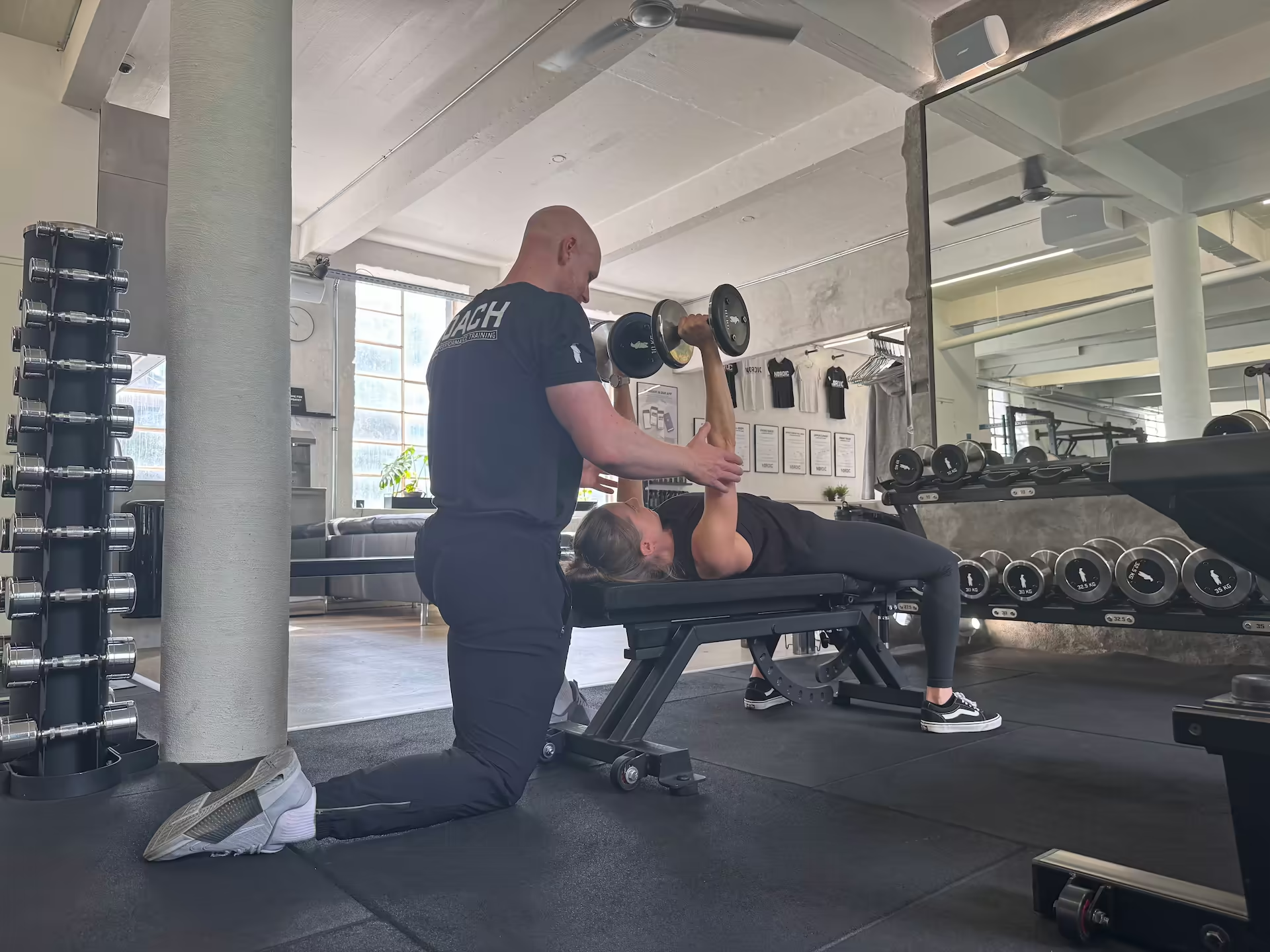
Now that you've reflected on your goals, schedule, and budget, let's talk about what actually makes a good personal trainer in Copenhagen.
There are thousands of people in this city calling themselves personal trainers. Some are excellent. Some are decent. Some are well-meaning but not very effective. And some should honestly not be coaching anyone at all.
So how can you tell the difference? Here's what we recommend looking for.
Here's a quick overview of the key differences between a professional personal trainer in Copenhagen and one you should avoid:
Education that actually matters
Saying "I've always been good at fitness" or "I played volleyball at elite level" is not a qualification for coaching or giving health-related advice. It certainly doesn't guarantee that they can help you reach your goals.
To be fair, a personal training certification or university degree doesn't automatically make someone a fantastic personal trainer either. But it shows a certain level of commitment to learning and professionalism.
Look for someone with:
- A bachelor's or master's degree in physiotherapy, sports science, or nutrition and health
- Certifications from respected organisations with exams (not a weekend course)
- Relevant specialisation courses
- A habit of continuing their education
A physiotherapist as a personal trainer has a 3.5-year professional degree in the body's anatomy, biomechanics, and movement — that provides a unique advantage in understanding and adapting training to your body.
In Denmark, "personal trainer" is not a protected title. This means anyone can set up a website and call themselves a personal trainer. It's worth doing some research before you invest your time and money.
But remember: credentials predict knowledge, not wisdom. The best personal trainers in Copenhagen combine solid formal education with the kind of experience and pattern recognition that only comes from training hundreds or thousands of different people over many years.
A documented track record of real results
A good personal trainer doesn't just talk about results. They can show them.
This could be documented client stories, Google reviews, or simply sharing examples of how they've helped people with similar goals to yours.
You can ask questions like:
- Have you helped someone with the same goal I have?
- How long does it typically take for your clients to reach that goal?
- What is your success rate with clients like me?
A professional personal trainer should be able to document and share success stories (with consent) and not just say their approach works without anything to back it up. They should tell you what has worked, what hasn't, and what they've learned along the way.
At Nordic Performance Training, we have over 350 5-star Google reviews from clients across Copenhagen, and you can read some of our client stories here.
Relevant specialisation for your needs
Most personal trainers have a general understanding of fitness and strength training, but their approach and the type of clients they work with can vary significantly.
Some work primarily with rehabilitation after injuries, others focus on performance goals like running or CrossFit, while some specialise in helping normal people become more structured and consistent with their training. If your goal is to get started with running — or set a new PR — you might benefit from reading one of our running guides, e.g. our 5 km running guide for a simple, effective, and realistic programme.
This specialisation matters when you choose a personal trainer, especially if you have specific goals.
Let's say you're preparing for a police or military fitness test, then you probably need someone who understands how to combine strength and conditioning training, and who knows exactly what's required to meet the physical demands. If your trainer mostly teaches yoga, it might not be the best match.
The same applies if you have chronic pain or are recovering from a serious injury, then you'll want someone with experience in that area who knows how to adjust exercises based on your situation, rather than someone who just tells you to push through the discomfort.
Take our client Sofie, 44, accountant from Christianshavn, who was recovering from chemotherapy and needed to rebuild strength safely. "I was nervous about doing it wrong or pushing myself too hard," she said. Thanks to our background as physiotherapists and personal trainers with experience in rehabilitation, we helped her regain not just physical strength, but also confidence in her body's abilities. Read our article Your Body Is Not Broken, where we dive deeper into how training can rebuild confidence and strength — even after pain or illness.
"It's not about finding the 'best' trainer. It's about finding the right place with the right trainer for you." — Lucas Iversen, physiotherapist & personal trainer
At Nordic Performance Training, our core focus is structured, simple, and effective strength training in Copenhagen for completely normal busy people. Most of our clients come to us because they want to feel stronger, be healthier, and finally master being consistent with their training. They want this in our private training centre in Copenhagen — a professional and distraction-free training environment.
Within this framework, we've also helped clients prepare for CPH Marathon, return to training after injuries or illness, improve in their sport, and build a solid strength foundation.
The point is not that one type of training is better than another. The point is that your trainer should have relevant experience with people like you. That's what makes it easier to feel understood, supported, and comfortable with the process from day 1.
Science-based approach and physiological understanding
A fantastic personal trainer doesn't need to have a PhD or be a researcher in exercise science, but they should understand why they do what they do, and more importantly, they should be able to explain it to you in a way that's simple and makes sense.
They should understand how the body responds to training, what it means to develop over time, how stress, recovery, load, and adaptation are connected. Not just because it sounds impressive, but because it's the foundation for helping you improve in a smart and sustainable way.
This doesn't mean every session should feel like a university lecture, but if you ask questions — like why you're doing a certain exercise, why the weight increased this week, or what you can expect in the coming months — your trainer should be able to answer clearly, without hiding behind complicated terminology or vague buzzwords.
Look for someone who:
- Can explain training decisions in simple, practical terms
- Uses objective tools to track your progress over time
- Refers to established principles and evidence-based methods
- Avoids pseudoscience, extreme claims, or trendy concepts they can't even explain
If a trainer can only talk about what "worked for them," or constantly changes your programme without clear reasoning, it's worth asking what their method is based on. If they can't answer that calmly and thoroughly, you might not be getting the professional guidance you deserve.
The best trainers don't just tell you what to do. They help you understand it. Because when you understand the process, it becomes much easier to trust it and stick with it long enough to see real results.
Communication and coaching style
When choosing a personal trainer in Copenhagen, this aspect is harder to quantify, but it matters just as much as everything else. Perhaps even more.
You want a personal trainer who listens — not just to what you say, but also to what you don't say. Someone who notices how your day has been before you even start your training. Someone who asks how you've slept, remembers that your knee has been bothering you, and knows how to adjust your training without making it feel like a defeat.
Fantastic personal training is about meeting you where you are that day — not where a generic plan says you should be. It's about explaining things in a clear, concise way that keeps helping you move forward.
One of our primary focus areas at Nordic Performance Training is being reactive in the right way. The training programme only changes when necessary, because structure is what drives progress, but how we coach you through it varies from session to session. Sometimes you feel strong, focused, and ready to push forward, and other days not so much. We know how to recognise the difference and adjust accordingly. That's what keeps training sustainable over time.
It's also about clarity. You should never leave a personal training session wondering what you just did or why. Your trainer should be able to explain the plan, show you your progress, and help you understand what's coming next.
You don't need to be best friends with your trainer. But you should feel safe, supported, and genuinely seen. Not just as someone performing repetitions, but as a whole person with a full life outside the gym.
Professionalism and structure
This is one of those things people tend to take for granted. Most assume that when they hire a personal trainer in Copenhagen, everything will naturally be organised, structured, and professional. But in reality, this varies just as much as coaching style or training methods, and it makes a huge difference.
You should expect your trainer to treat your time with the same respect they expect you to have for theirs. That means showing up on time, being prepared, having a shared plan, communicating clearly, and not cancelling last minute or being late without good reason.
It also means there should be a clear plan and process behind the training sessions. Your personal training should not feel random. There should be a long-term plan in place, not just a collection of exercises thrown together randomly for the sake of variety. You deserve to know where you're headed, how you're developing, and how the training is adjusted based on your feedback and performance.
At Nordic Performance Training, we don't just coach on intuition. Every single client follows a structured training programme with a clear direction, but we remain flexible in how we deliver it, adjusting variables like when to increase load, when to add repetitions, and when to change exercises to keep things effective without losing the foundation.
In our private training centre in Copenhagen, we track your progress in our training app, we communicate openly about expectations, and we always treat your time and energy with the same respect we expect from you.
When you work with a professional, it feels different. There's clarity, there's consistency, and there's a quiet confidence that comes from knowing someone is guiding the process with experience, precision, and attention. That makes it easier for you to show up, focus on the training, and trust that it's working.
Personal chemistry and motivation
You're going to spend a fair amount of time with your personal trainer. Often 1 to 4 hours per week over several months or years. So yes, personal chemistry matters — and probably more than people realise at the start.
It's not about becoming best friends or having exactly the same humour. It's about whether you feel comfortable around them, whether you trust them, whether they create a training environment where you actually want to train, even on days when you don't really feel like showing up.
When that kind of relationship is in place, everything else becomes easier. Sessions feel less like obligations, you start building real momentum, training slowly becomes part of your life instead of something you constantly have to convince yourself to do.
At Nordic Performance Training, one of our biggest priorities is being the kind of trainers our clients actually want to spend time with. That doesn't mean being overly chatty or entertaining, but more about creating an environment where you feel supported, respected, and challenged in exactly the right way.
If you've worked with a good coach or mentor before — in any area of life — you'll recognise the feeling. They're calm but focused, encouraging but honest, they make expectations clear but never make you feel like you're failing, and they meet you where you are while always keeping perspective on where you're heading.
In practice, it looks like this:
- They are positive and encouraging and celebrate your progress without making it feel forced
- They communicate clearly and directly, challenge you when necessary while helping you keep improving
- They are patient and grounded, able to maintain long-term perspective while being fully present in each session
- They are structured and goal-oriented, but they include you in the process so the training feels collaborative and personal
When these qualities are in place, motivation becomes easier. You don't just show up out of guilt or willpower. You show up because the process feels valuable, and because there's someone who is truly invested in helping you succeed.

Choose a trainer who practises what they preach
This one can be harder to define, but you'll feel it when it's there. And you'll certainly notice when it's missing.
A good personal trainer should practise what they preach. That doesn't mean they need to look like a fitness model or train for the Olympics, but they should believe in the methods they recommend and apply them in their own life, at least in some form.
So if your trainer never trains themselves, constantly complains about being tired or unmotivated, or doesn't seem to have any structure or direction in their own training routine, it's fair to ask: how could they help you achieve those things if they don't do it themselves?
At Nordic Performance Training, all our personal trainers are educated physiotherapists, and they follow the same training principles we give to our clients. We train ourselves in a structured and sustainable way, because we don't ask our clients to commit to something we don't do ourselves.
But it's not solely about what someone does in the gym. It's also about energy and attitude in general.
If a trainer constantly seems negative, pessimistic, or generally disinterested in their work — if they talk as if they're tired of coaching, or don't seem to enjoy working with people — that's a red flag. You're hiring someone to support your growth, and if they're stuck in their own frustration or burnout, it will negatively affect your experience and progress.
Clients can tell when a trainer is just running on autopilot, and they can certainly feel when someone truly cares about what they're doing.
A good personal trainer doesn't need to have all the answers. But they should be honest, consistent, and live by the principles they teach. That's what creates trust — and trust is what makes training sustainable.
5 Red Flags to Avoid When Choosing a Personal Trainer in Copenhagen
Sometimes the best way to make a good decision is to know what to avoid. We've spoken with many people who started with the wrong trainer and ended up frustrated, unmotivated, or even injured. Not because they didn't try, but because the coaching wasn't what they needed.
Here are 5 common red flags to watch out for. If you see one or more of these, it's worth reconsidering.
"We often meet clients who have wasted both time and money with trainers who show these red flags. You don't need to make the same mistakes." — Kasper Vinther, physiotherapist & personal trainer
1. Unrealistic promises
"Lose 10 kg in 30 days" or "guaranteed transformation in 6 weeks" sounds enticing, especially if you've struggled to see progress. But it's usually a sign that something is wrong.
Professional trainers know that real results take time and depend on factors beyond both your and their control. Life happens. Work gets stressful. Kids get sick. Your body doesn't follow a predetermined schedule just because someone said it should.
What you should hear instead: A good trainer promises their best effort, full attention, and a structured approach. They focus on the process and build routines that make results lasting.
2. Random personal training sessions without structure
If your training sessions feel completely different every time, and you never know what you're showing up to or why, your trainer probably has no long-term plan for you.
Variation can be useful, but only when it's built on structure. You need repetition and mastery to get stronger and more confident, not just new exercises for entertainment.
What you should see: A training programme tailored to your needs and progress. If you can't see how this week's training builds on last week's, then your body can't either.
3. No interest in your background
A good trainer should want to know who you are. Not just your training goals, but your history, previous injuries, training experience, work, and what's going on in your life outside the gym.
This context matters enormously. If you've struggled with motivation before, if certain exercises make you nervous, or if you have a demanding job, that should influence how your training is structured and delivered.
Red flag: The trainer doesn't ask about these things or seems disinterested in your answers. They treat you as a generic task instead of a unique person with unique needs.
4. No documented results
Any experienced trainer should be able to show you proof that their approach works. This could be client stories, Google reviews, testimonial videos, or examples of clients with goals like yours.
If they have no references, or become defensive when you ask, it's worth being cautious. You deserve to know if others have trusted this person before, and what results they've helped people achieve.
What you should demand: Professional trainers are proud of their clients' success stories and happy to share them (with consent). See for example short excerpts here, read detailed client stories here, or check our 350+ Google reviews as examples of documented results.
5. Lack of boundaries and professionalism
This one might not be obvious right away, but over time it significantly affects the quality of your experience.
If a trainer constantly allows last-minute rebookings, responds to messages around the clock, often arrives late, or operates without structure around their schedule, it's a sign that they're overloaded or struggling to manage their own time.
This can seem like flexibility, but when a trainer doesn't set healthy boundaries or take care of their own routines, they often can't be fully present for their clients either.
What you should see: Fixed training times, clear boundaries, and respect for both their and your time. Professional trainers operate with structure around their schedule, show up on time, and communicate clearly about expectations. Respect goes both ways — when a trainer respects their own time, they're far more likely to respect yours.
5 Important Questions to Ask Your Potential Personal Trainer in Copenhagen
Once you've narrowed down your options, it's time to have real conversations. Whether you're meeting for a free introductory consultation, exchanging emails, or talking over the phone, these questions can help you determine whether the personal trainer is actually a good fit, both professionally and personally.
You don't need to interrogate them, but you should understand what you're getting into. A professional personal trainer should be able to answer these questions without hesitation. If they can't, that tells you just as much as any answer would.
"If a personal trainer or training centre doesn't offer a free introductory consultation, that's a red flag in itself. Professional personal trainers want to make sure it's the right match for both parties." — Lucas Iversen , physiotherapist & personal trainer
Use this overview as a checklist during your introductory consultation:
1. What do you specialise in, and why does that fit my goal?
This is where you discover whether the trainer has relevant experience with people like you. Listen for clear, specific answers — not vague generalities.
If you're recovering from an injury, they should be able to talk confidently about that process. If you want to build strength without having to train 5 days a week in the gym, they should understand how to make your training efficient.
You're not looking for a perfect match on paper. You're looking for someone who understands what matters to you and can explain why their approach will support your specific goals.
2. Can you describe your process for someone like me and show examples of other similar clients?
Before you commit to anything, you should have a clear understanding of both the theoretical approach and how it works in practice.
Ask about the process:
- How many sessions per week would we have, and how long do they take?
- How is the training structured over time?
- How do you measure my progress?
- What happens between our sessions?
Ask for concrete examples: They can show you videos from their social media, walk through a client story that resembles your situation, or describe how they've helped someone with a comparable background and goals. The point is to give you a more concrete picture of what you can expect.
If they can't answer both parts clearly, it may indicate a lack of systematic structure or limited experience with clients like you.
3. What is your education and certification background?
Take the time to understand your trainer's background and how much effort they've invested in becoming skilled at what they do.
Do they have relevant formal education in areas like physiotherapy, sports science, or human nutrition? Do they actively continue their education through courses, mentorships, or certifications? Do they stay up to date with training research, or do they still rely on what they learned years ago?
The best personal trainers in Copenhagen are always learning. Not because they have to, but because they genuinely care about improving — for themselves and for the people they coach.
4. How do you handle plateaus or periods of slow progress?
If you train consistently long enough, you'll likely hit plateaus. That's completely normal. The question is whether that plateau represents a natural part of your development, or a sign that something in your training approach needs to be adjusted.
A professional trainer should be able to help you navigate this difference. Sometimes maintaining your current level is precisely appropriate, especially if your life outside the gym is particularly demanding. Other times, a small but strategic change may be necessary.
If the plateau is motivational rather than physical, they should also know how to support you through it. The right coach won't panic but will listen and develop appropriate solutions.
5. What does your service include, and what are your terms and prices?
This combined question clarifies both value and practical expectations at once.
Ask about service and support: What kind of support is available outside the gym? Do they help with lifestyle guidance, programming for your off days, or general accountability between sessions? Does it include apps, videos, or other guidance?
Clarify practical terms: Ask about commitment periods, whether sessions are sold individually or in packages, cancellation policy, and whether sessions are scheduled at fixed times or with flexible booking.
At Nordic Performance Training, we offer training programmes of 6 or 12 weeks with 1-3 fixed sessions per week, plus access to our training app with exercise demo videos, result tracking, and nutritional guidance. We always start with a free introductory consultation so you can make an informed decision.
A professional personal trainer should be transparent about both value and expectations from the start. When both parties understand what to expect, everything runs more smoothly.
Can a Personal Trainer Really Make You Stronger With Only 1-2 Sessions Per Week?
Absolutely. This isn't just something we've observed in thousands of clients — it's also supported by significant research.
Most of our clients train only 1-2 times per week. They're busy, career-driven, often parents with complete lives and limited time. Yet they get stronger, feel better, and maintain progress over time.
Research consistently shows that 1-2 full body training sessions per week can lead to measurable improvements in strength, muscle mass, and long-term health outcomes. The key is structured training with proper technique, progressive loading, and consistency over time.
Rebecca, 41, manager from Østerbro, didn't believe 1 time per week could make a difference. "I was starting to lose confidence and could feel I was getting older," she said. After 9 months of structured strength training, she felt stronger and just as confident as she did in her late twenties.
Many clients have significantly reduced their training volume from previous training routines and still achieved better progress, simply because their new approach was realistic and sustainable.
The traditional fitness industry wants you to believe that more is always better. But for most people, the opposite is true. Less training volume with higher quality and consistency produces superior long-term results.
At Nordic Performance Training, we've optimised everything around this principle. Our clients succeed with minimal time investment because every aspect of their programme is targeted and progressive.

Why Personal Training Is an Investment, Not an Expense
This connects directly to what we discussed earlier about prices and value.
If you evaluate personal training purely as a price-per-hour service, it can seem expensive compared to other activities. But when you consider what the right trainer can help you achieve — and how that improves your entire experience outside the gym — it becomes one of the most effective investments you can make.
Let's revisit the economics:
A skilled trainer at 800 kr per session who helps you reach your goals in 48 sessions costs 38,400 kr. Those sessions create lasting behavioural change and physical improvement that benefits you for years — perhaps even the rest of your life.
A less experienced trainer at 600 kr per session may seem cheaper, but if they lack clear methodology or systematic progression, you spend 28,800 kr on training without meaningful progress — then you have to start all over again.
"The real costs are not what you pay per session — it's the months of wasted time and thousands of kr on training that doesn't work." — Kasper Vinther, physiotherapist & personal trainer
Take Johanne from our earlier example: After wasting 12,000 kr on ineffective training, she invested in quality and achieved lasting results. Her investment continues to pay dividends year after year through better health, energy, and confidence.
Quality personal training pays dividends over time. Ineffective training will always be the most expensive option in the end.
Frequently Asked Questions About Personal Training in Copenhagen
How do I choose the right personal trainer in Copenhagen?
Look for five key factors: Documented results, relevant experience with your goals, professional education, structured method, and good personal chemistry. Start by clarifying your goals and realistic schedule. Then seek a trainer who can explain their process clearly, show examples of other clients they've helped, and whom you feel comfortable with. Ask about their background and how they measure progress — the quality of the relationship matters more than most people realise.
What does personal training cost in Copenhagen?
600-1,500 kr per session. Independent trainers typically start at 600-800 kr, while experienced trainers with health science backgrounds in private centres charge 800-1,500 kr. Remember that cheaper doesn't automatically mean better. Ineffective training that doesn't produce results often ends up being more expensive in the long run than investing in quality coaching from the start. Read our complete price guide for an in-depth comparison of what personal training costs in Copenhagen in 2026.
Should my personal trainer have specific certifications?
Yes. Your trainer should have recognised certification or be an authorised health professional (e.g. physiotherapist), since "personal trainer" is not a protected title in Denmark. Investigate their education thoroughly. The best trainers combine formal education with ongoing continuing education through courses and mentorships. Ask how they stay up to date with the latest research.
How do I know if my personal trainer is effective?
An effective trainer explains exercises, measures progress objectively, adapts training to your life, and can document results through client recommendations and Google reviews. Look for someone who adjusts training to your needs, creates a professional environment, and supports you through both good and challenging periods. If they can't document their effectiveness with concrete client stories, consider looking elsewhere.
Can I get results by only training 1-2 times per week?
Yes. Research shows that 1-2 structured full body training sessions per week provide measurable improvements in strength, muscle mass, and general health. The key is properly designed training with progression. Random training sessions don't work — you need systematic programming that builds on itself over time. Many of our busiest clients achieve excellent results with this frequency.
How long should I commit to personal training?
Minimum 12-16 sessions (3-4 months at 1x/week) to establish a foundation and see meaningful progress. A 6-month commitment is optimal for building lasting habits. The best trainers focus on teaching you sustainable approaches instead of creating dependency. The goal is to develop knowledge and confidence that serves you long-term — even when you stop personal training.
What can I expect at my first training session?
A thorough conversation about your background, goals, and life situation before the actual training. Professional trainers use the first session to understand you as a person — not just your training goals. They assess your movement patterns, explain their approach, and outline realistic expectations. You should leave the session with clarity about the process and confidence that they understand your needs.
What's the difference between personal training and group training?
Personal training gives you individual attention, a tailored programme, and direct feedback on your technique. Group training follows a generic programme for the entire group without personal adaptation. In personal training, every exercise is adjusted to your body, your injuries, and your level. You get constant feedback and progression designed specifically for you. In group training, you share the trainer's attention with 5-30 other people, and the programme is the same for everyone regardless of experience or limitations.
Is personal training worth the money?
Yes, if you choose an experienced trainer with documented results. Investing in quality coaching saves you wasted months of ineffective training and prevents injuries from poor technique. Compare: 38,400 kr for 48 sessions with an experienced trainer delivers lasting results, while 28,800 kr with a cheap trainer often ends with you having to start over. The right trainer teaches you to train effectively for the rest of your life.
How often should I train with a personal trainer?
1-2 times per week is optimal for most busy Copenhageners. This provides sufficient structure for progress without taking over your calendar. Some start with 2x/week for the first 2-3 months to learn the fundamentals, then 1x/week for maintenance and progression. The most important thing is consistency — 1 time every week for 2 years gives better results than 3 times per week for 2 months.
Can I have a personal trainer without a gym?
Yes. Many personal trainers work in private training centres, come to your home, or offer outdoor training in Copenhagen. Private training centres like Nordic Performance Training provide a distraction-free environment without waiting for equipment or interruptions. Home training can work but requires basic equipment. Ask your potential trainer where they work and whether the facilities suit your goals.
The Big Decision: How Do You Choose Right
Choosing a personal trainer in Copenhagen is a bigger decision than most people realise. It's not just about who's cheapest or available first.
It's a significant investment — both financially and health-wise. Chosen correctly, it becomes one of the best investments you can make. Chosen incorrectly, it becomes wasted money, wasted time, and great frustration.
Big decisions you need to make:
- Private training centre vs. large commercial fitness centre
- Experienced educated trainer vs. cheap inexperienced trainer (and the price difference)
- 1-2 sessions vs. multiple times per week
- Structured approach vs. random training sessions
What should you prioritise?
Start with clarity about your goals — even if it's just building a sustainable routine. Be realistic about time — for most people, 1-2 training sessions per week is optimal. Choose a trainer with structure, documented results, and the ability to adapt to your life.
Look for someone who tracks your progress objectively, respects your time, and explains their decisions clearly. Consider practical factors: location, environment, and whether you feel comfortable there.
Remember: You're not just investing in training sessions — you're investing in your future health, strength, and confidence. These results follow you for the rest of your life, if the choice is right.

Ready to make the right decision?
If you want to hear more about Nordic Performance Training, we offer a free introductory consultation with no obligation.
In the consultation, you get:
- Personal advice on what it takes to reach your goals
- Insight into our structured approach and training concept
- Answers to all your questions about training, schedule, and prices
- The opportunity to see our private training centre
Book your free introductory consultation here
No obligation. Just an honest conversation about the right choice for you.
Referencer
Gjestvang, C., Kalhovde, J. M., Tangen, E. M., Clemm, H., & Haakstad, L. A. H. (2025). Impact of in-person and mobile exercise coaching on psychosocial factors affecting exercise adherence in inactive women with obesity: 20-week randomized controlled trial. Journal of Medical Internet Research, 27, e68462. https://doi.org/10.2196/68462
Gómez-Redondo, P., Valenzuela, P. L., Morales, J. S., & Lucia, A. (2024). Supervised versus unsupervised exercise for the improvement of physical function and well-being outcomes in older adults: A systematic review and meta-analysis of randomized controlled trials. Sports Medicine, 54(7), 1877–1906. https://doi.org/10.1007/s40279-024-02024-1
Grgic, J., Schoenfeld, B. J., Davies, T. B., Lazinica, B., Krieger, J. W., & Pedisic, Z. (2018). Effect of resistance training frequency on gains in muscular strength: A systematic review and meta-analysis. Sports Medicine, 48(5), 1207–1220. https://doi.org/10.1007/s40279-018-0872-x
Lu, Y., Lin, L., Xia, M., Chen, W., & Zheng, Q. (2024). Comparing the impact of personal trainer guidance to exercising with others: Determining the optimal approach. Heliyon, 10(2), e24625. https://doi.org/10.1016/j.heliyon.2024.e24625
Saeidifard, F., Medina-Inojosa, J. R., West, C. P., Olson, T. P., Somers, V. K., Bonikowske, A. R., Prokop, L. J., Vinciguerra, M., & Lopez-Jimenez, F. (2019). The association of resistance training with mortality: A systematic review and meta-analysis. European Journal of Preventive Cardiology, 26(15), 1647–1665. https://doi.org/10.1177/2047487319850718
Schoenfeld, B. J., Grgic, J., Haun, C., Itagaki, T., & Helms, E. R. (2023). Resistance training recommendations to maximize muscle hypertrophy in an athletic population: Position stand of the IUSCA. International Journal of Strength and Conditioning, 3(1). https://journal.iusca.org/index.php/Journal/article/view/81
Steele, J., Fisher, J. P., Assunção, A. R., Bottaro, M., & Gentil, P. (2023). Long-term time-course of strength adaptation to minimal dose resistance training through retrospective longitudinal growth modeling. Research Quarterly for Exercise and Sport, 94(4), 913–930. https://pubmed.ncbi.nlm.nih.gov/35591809/
Related Blog Posts
.svg)
.svg)

.svg.webp)

